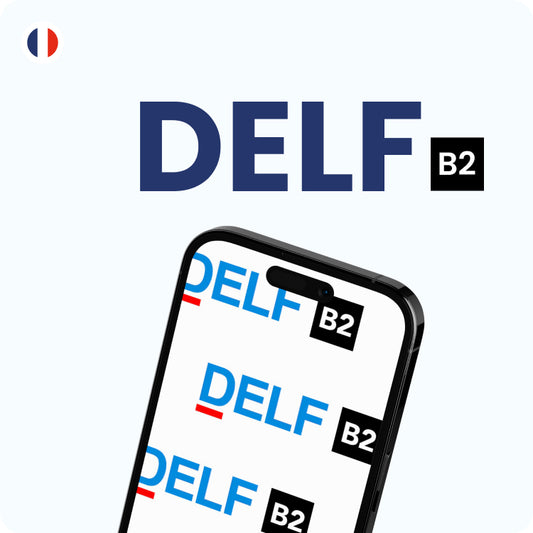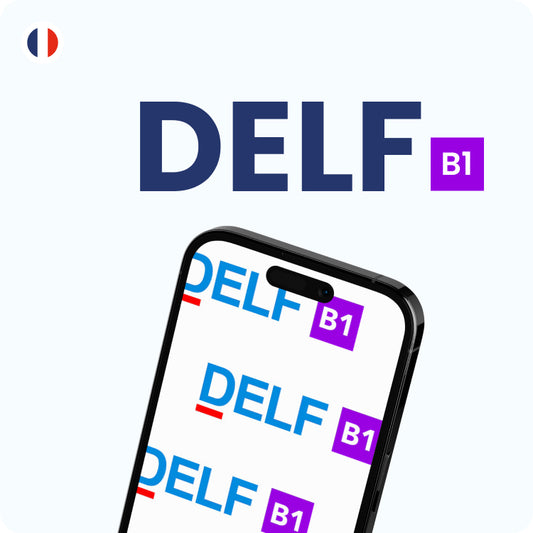DELF B1 2025 test training
The DELF B1 is an official, internationally recognized diploma that certifies your level of French proficiency. This assessment is required to apply for French citizenship and is also intended for those who wish to validate their language skills for personal, professional, or academic purposes. Discover the different tests to prepare for, the grading system, and practical advice to maximize your chances of success.
Associated collection
-
PrepMyDELF B2
Regular price 99€Regular priceUnit price / per -
PrepMyDELF B1
Regular price 99€Regular priceUnit price / per -
DELF B2 mini-test
Regular price 0€Regular priceUnit price / per
DELF B1 2025 test training
What is DELF B1 ?
The DELF (Diplôme d' Études en Langue Française) is a diploma, accessible to all, which certifies the level of French according to the scale of the Common European Framework of Reference for Languages (CEFR). This diploma, issued by France Éducation International under the supervision of the French Ministry of National Education, is recognized worldwide by administrations, employers and academic institutions. Visit our page dedicated to preparing for the DELF test and discover how to prepare for the DELF B2 test !
The DELF exists in several variants depending on the age and level of the candidate. This article only covers its main version, which is aimed at adults and adolescents over 16: the DELF "general public."
The DELF level B1 certification, corresponding to an intermediate level (threshold), is required to obtain French nationality. Obtaining the diploma means that you are able to:
- describe various subjects in a simple and structured manner;
- write clear and organized texts;
- understand factual information on current or professional topics;
- follow conversations or presentations on familiar topics at work, school, or leisure.
| Please note that for level C1 (independent) and C2 (mastery) certifications, the exam is called Advanced Diploma in French Language (DALF): DALF C1 and DALF C2. |
Once the assessment is passed, the certification is valid for life.
DELF B1 exams
The DELF B1 exam consists of four tests: three group tests and one individual test. These tests assess comprehension and production, both written and oral.
Listening comprehension
You listen to various audio documents and answer multiple-choice or short-answer questions. The test lasts 25 minutes and includes 3 exercises:
- Exercise 1: understand a dialogue on everyday life situations;
- Exercise 2: understand a radio program on a professional subject;
- Exercise 3: understand a general topic covered in a program.
Reading comprehension
The candidate reads several written documents and answers multiple-choice, short-answer, or true/false questions. This assessment lasts 45 minutes and contains two exercises:
- Exercise 1: identify information in practical documents (brochure, advertisement, menu, etc.);
- Exercise 2: Understanding an article of general interest.
Written production
You write a text of at least 160 words to express a personal point of view based on a written document (letter, email, newspaper article, forum essay, form, etc.). This part lasts 45 minutes.
Oral production
The individual assessment, in front of two examiners, is divided into three parts:
- Guided interview (2 to 3 minutes): introduce yourself and talk about yourself to the examiner;
- Expressing a point of view (3 to 4 minutes): discussing an unusual everyday situation (role play with the examiner);
- Interactive exercise (3 to 4 minutes, with 10 minutes of preparation taking place before the test): present a structured presentation based on a short document.
The test lasts 15 minutes (and 10 minutes of preparation).
Understanding the notation
Each test is marked out of 25 points, for a total of 100 points. To pass, the candidate must:
- obtain at least 5/25 in each test (elimination mark below);
- achieve an overall score of at least 50/100.
Correctors and examiners assess on specific criteria:
- For group tests, the examiner assesses: compliance with instructions, ability to present facts and express one's thoughts, coherence and fluency of speech, lexical and grammatical competence, as well as spelling.
- For the oral test, the examiner assesses: mastery of vocabulary, morphosyntax (use of simple and complex sentences) and phonological system (flow and pronunciation).
How to train for the DELF B1 ?
DELF B1 training should be progressive and rigorous. Familiarize yourself with the exam format and practice under conditions similar to those of the test.
PrepMyFuture has co-developed with the Alliance Française de Paris, an online training course including: 60 course sheets with examples, more than 1,500 questions to work on each skill, 3 complete practice tests and 1 DELF B1 mini-test to practice in real conditions and detailed answers to identify and understand common errors.
How to register for the exam ?
To register, contact an examination center directly, in France or abroad. The list of centers where you can take the DELF B1 is available on the official France Éducation International website.
Each diploma being independent, it is possible to take the DELF B1 without having validated the A2 level.
The center will provide you with all the necessary information (date, location, registration fees, and required documents). On the day of the exam, remember to present the ID used during registration. Please note that dictionaries are prohibited in the exam room.
Where to take the test ?
The DELF exam can be taken at numerous centers across France and abroad. Most centers hold monthly sessions. However, the exam is exclusively held in person. Contact your center for exact dates.
Why take the DELF B1 ?
The DELF B1 is an official, internationally recognized diploma that opens up numerous opportunities. It is essential for any application for naturalization or to obtain French nationality.
Preparing for and passing the DELF B1 allows you to develop your skills in FLE (French as a Foreign Language). This diploma enhances your practice of FLE, strengthens your confidence in French, improves your mastery of FLE on a daily basis, and facilitates integration into a French-speaking environment. It also certifies your level in FLE and opens doors to study, work, or live in a French-speaking country.
Professionally, the DELF B1 is valued as reliable proof of your FLE skills, strengthening your CV and your applications for a job or internship requiring French proficiency. With regular FLE monitoring, it's also possible to continue progressing after the exam to reach a higher level. Finally, this diploma has no validity limit: once obtained, it stays with you for life.
Tips for passing the DELF B1
To ensure your success in the DELF B1 assessment and achieve the required score (50/100), it is essential to prepare for the exam seriously and in advance. Choose the diploma that corresponds to your level of French and define your objectives, particularly if you need a certain level for a specific job or training.
Familiarize yourself with the exam format and practice regularly, working on the four skills: reading and listening, writing, and speaking. To improve, expose yourself to the language as much as possible by listening to podcasts or watching videos in French, reading daily, and writing short texts. Chat with native speakers and record yourself to track your progress.
Each test requires a specific approach, so always read the instructions carefully. For listening comprehension, answer the simple questions first and adjust your answers the second time. For reading comprehension, set aside a few minutes to proofread. When writing, organize your ideas in a rough draft before beginning. Finally, for speaking, adopt a confident attitude, look at the examiner who is speaking to you, and use logical connectives to structure your words.
Once you've mastered the exam rules, practice with real-life practice tests using PrepMyFuture to familiarize yourself with the format and time management. During practice periods, take the time to analyze your mistakes and correct them and identify areas for improvement. Proper and regular practice will allow you to approach the exam with confidence.
Associated collection
-
PrepMyDELF B2
Regular price 99€Regular priceUnit price / per -
PrepMyDELF B1
Regular price 99€Regular priceUnit price / per -
DELF B2 mini-test
Regular price 0€Regular priceUnit price / per
FAQ
Frequently Asked Questions
What is PrepMyFuture and how does it work?
PrepMyFuture is a 100% online platform dedicated to preparing for language tests and certifications. Once registered, you'll access a structured program with courses, interactive exercises, and progress tracking tools.
How are PrepMyFuture courses different?
Our courses are designed specifically for each certification (TOEIC, CLOE, etc.), with targeted content, realistic training, immediate feedback and personalized support.
Were the contents designed with official publishers?
Yes. For some certifications, such as the TEF, we use official content provided by the CCI of Paris Île-de-France to prepare you in conditions as close as possible to the actual exam.
How do I track my progress on the PrepMyFuture platform?
You have a personalized dashboard to track your results, visualize your progress and identify the skills to strengthen at each stage of the training.
*What is PrepMyFuture's money-back policy?
To obtain a refund, the request must be submitted within 7 days of purchase and must have completed fewer than 100 questions. The request must be sent to Adm@7speaking.com .


